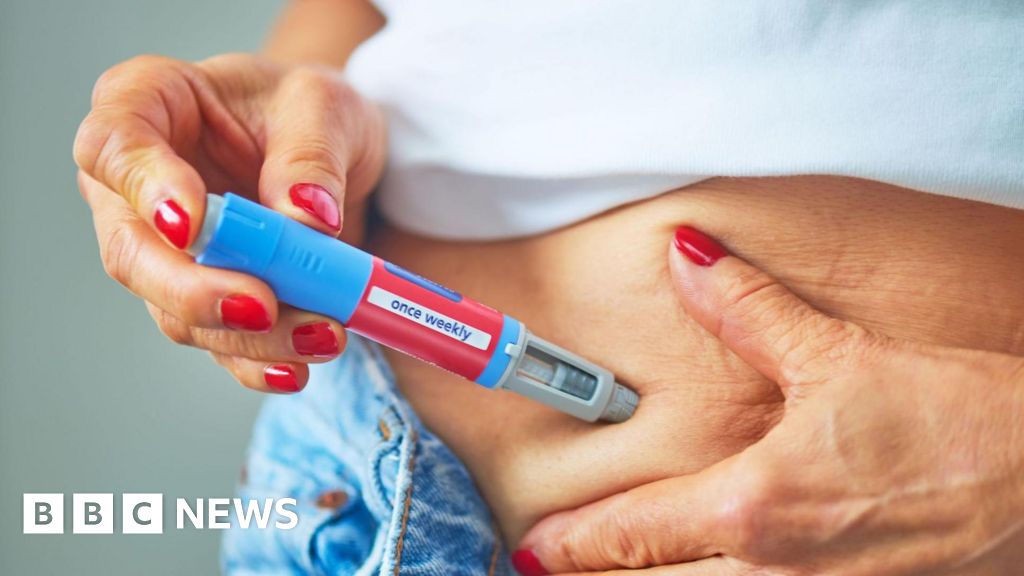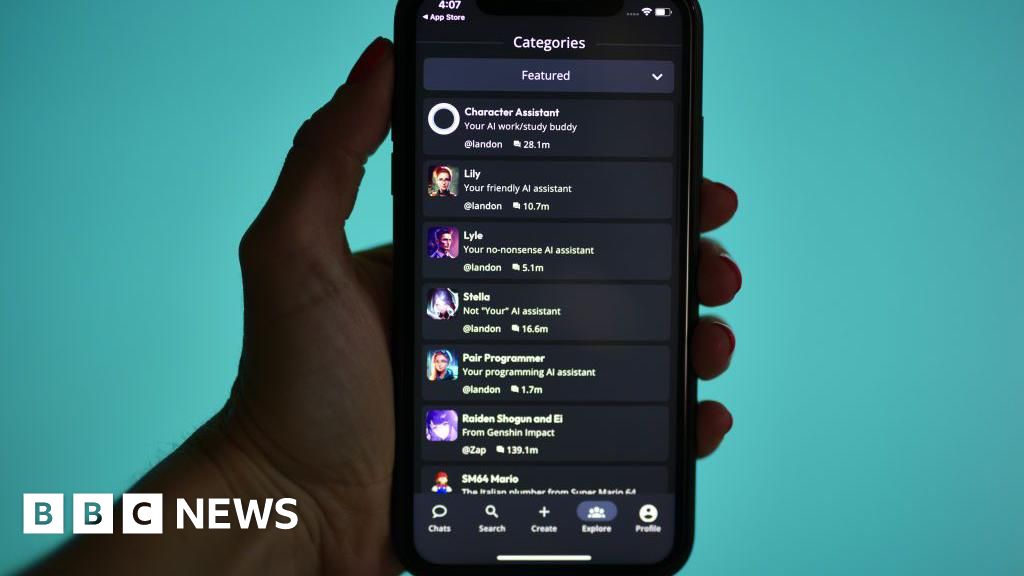Ruth CleggHealth and wellbeing reporter

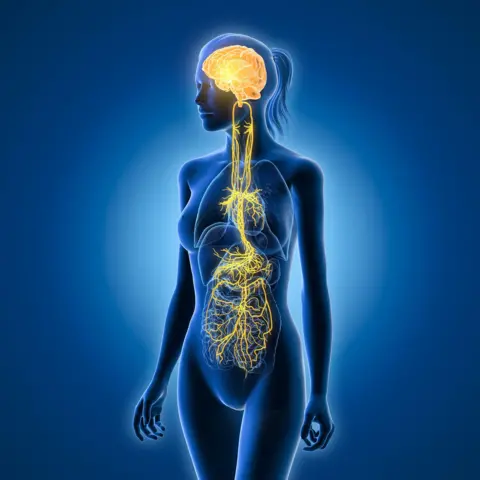 Alamy
Alamy
It's the body's superhighway that carries information from your brain to your major organs. You might not have a clue it exists - let alone that you might need to train it.
But a quick scroll through my social media and there's a whole array of tips on how to heal it, stimulate it, even reset it - all to apparently reduce stress and anxiety levels.
Poking your ear with what looks like a rubber toothbrush, moving your eyes from side to side, tapping your body or gargling water while wearing a weighted vest - these are just some of the techniques being recommended to train that nerve and improve your wellbeing.
With our stress levels sky-high, and burnout on the rise among under-35s, it's no wonder many of the posts on socials have gone viral with millions of hits.
Some of these methods might seem a bit absurd. But is it really possible to train your mighty internal messenger, and could that actually bring quick relief to life's stresses?

 @cariad.connection
@cariad.connection
Yoga therapist Eirian Collinge uses breathwork, eye movements, and tapping in her practice
I decided to find out by coming to small candle-lit studio in Stockport town centre - where I find myself in a small group, humming loudly.
Humming, I am told, can help stimulate our vagus nerve and slow down our heart rate. And I do start to feel a bit more relaxed. I can feel the low hum vibrating in my body and my brain seems a bit less busy.
At this somatics class, yoga therapist Eirian Collinge guides us through a session of gentle moves combining deep breathing, rocking and swaying.
While she doesn't buy into all the techniques on socials, Eirian says there are parts of her practice that use breathwork, eye movements and tapping.
But, she says, "it's a process" and there's no quick fix. It is rooted in a theory that suggests we can calm down our nervous system by connecting with our bodies.
Some scientists say this is an over-simplification of our complex internal systems. But others say it can be effective in helping us find a snippet of calm in a busy, intense world.
Sarah, who is lying down just a few mats away from me, started coming to this class about a year ago. She says the practice has been life-changing.
"I actually cried after the first session," she says. "It felt like the first time my brain has ever switched off."
The 35-year-old, who struggles with her mental health, says it feels like she is "flossing her brain".

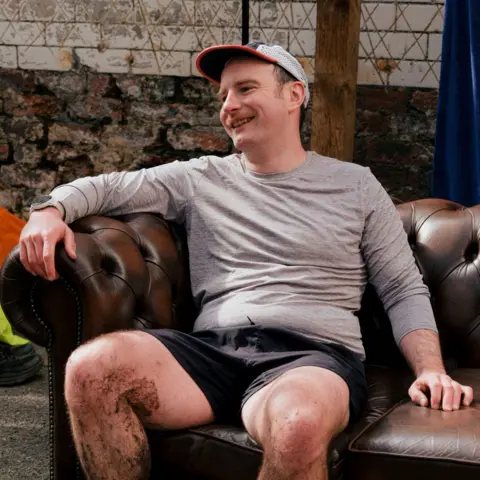 Xander
Xander
Xander says he now knows what to do when he is overwhelmed, like going for a run in the muddy hills
Sarah's partner, Xander, agrees. It's made him more aware of his feelings.
"As a man," he explains, "We are not really programmed to do that.
"I've struggled with depression for most of my adult life, but now, instead of trying to fix my thoughts I can sit with my emotions and accept them.
"If things get a bit much for me I can peel back a little from work. Go for a run, get out in the hills, for example.
"Understanding my nervous system is a huge part of that."
The vagus - Latin for "wandering" - starts in the brain as two main branches - left and right - that connect to every major organ, constantly relaying vital information back and forth.
It's part of the autonomic nervous system, which controls things we don't think about, like breathing, heart rate and digestion.

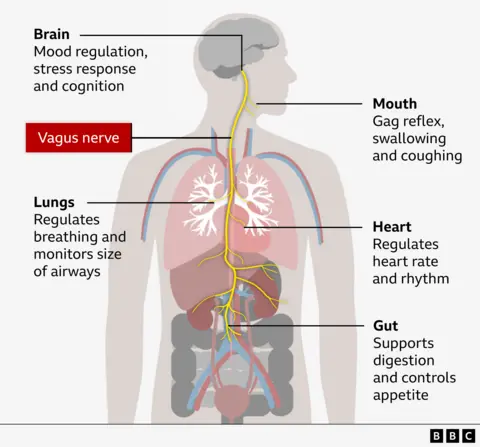
The system, in part, is made up of:
- the sympathetic nervous system - which triggers "fight or flight", preparing us for anything from being chased by a wild animal to that all important job interview, and
- the parasympathetic nervous system - which relies on the vagus nerve to help put the brakes on and brings the body back into a state of calm
If one of these is out of sync we start to see problems. But can we really reset the balance ourselves, by attempting to activate the vagus nerve?
Consultant psychiatrist Prof Hamish McAllister-Williams is sceptical.
"We have good evidence vagus nerve stimulation can help with neurological disorders like epilepsy and mental illnesses like treatment-resistant depression," he says, "but that comes from a device that is fitted in the body - a bit like a pacemaker which sends pulses of electrical energy to the vagus nerve."
That device sends mild electrical stimulations through the vagus nerve to the brain, sparking a release of chemicals like serotonin and dopamine which help us regulate our mood.
While vagus nerve stimulation inside the body requires invasive surgery and is available for a small cohort of patients on the NHS, there is now a growing market for wearable - non-invasive - technology.
These devices, which cost anything from £200 to more than £1,000, tend to be clipped on the ear, worn round the neck or placed on the chest.

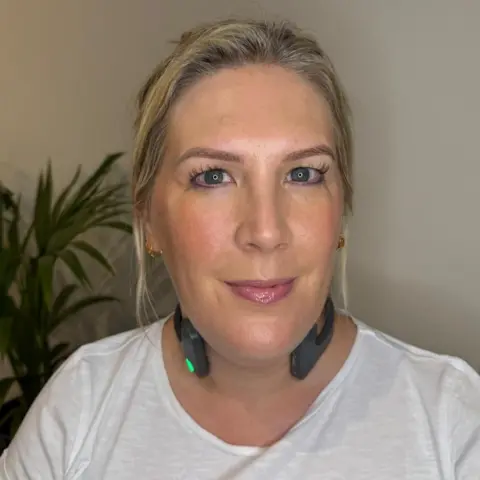 @lucylambertco
@lucylambertco
Lucy was burnt out and felt she had nowhere to turn before discovering these devices
"The are some credible studies that suggest these external stimulators can potentially impact on brain activity," Prof McAllister-Williams explains. "But there is a lot less evidence than for the internal devices."
With external devices, the electrical impulses need to travel through skin, tissue, muscle and fat so it's not as simple and direct as a stimulator in the body.
After she experienced burnout, Lucy Lambert says such non-invasive vagus nerve stimulators helped her.
The mother-of-three left her job as a primary school teacher because she was so completely "stressed, tired and anxious".
"I had been running on empty for so long - I didn't realise," Lucy says. "Then it hit. The to-do list of life became too much.
"The mental load was so huge I couldn't get out of bed."
After exhausting various medical routes and feeling like she was getting nowhere, Lisa's brother recommended one of these devices which vibrates, claiming to send low-level electrical pulses to the vagus nerve, often through the skin in the neck or ear area.
"I noticed that when I started to feel overwhelmed, I would get a headache first.
"I would then wear a device for 10 minutes twice a day; the pain from the headache would go, and my whole body would calm down.
"The vibrations, they really do something."
She says the devices didn't fix burnout but they helped her create "conditions where real healing can happen".

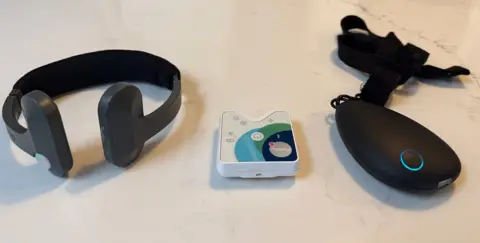 @lucylambertco
@lucylambertco
Lucy has a range of non-invasive vagus nerve stimulators which she uses along with taking time out and slowing down her pace of life
Dr Chris Barker, who works in pain management, says this area of medicine is still developing.
He says there is a growing understanding of the importance of the vagus nerve, but while there is "clear evidence" around the impact an unbalanced nervous system can have on everything from our mental health to our heart rate and our ability to digest food, it does not mean we have the all the answers - yet - on how to correct the problems.
"It's really rational to focus on something that's problematic - and try to fix it.
"Our bodies are, of course, really complex, and sometimes the problem we see may be part of an imbalance in a wider system."
It's not about going to extremes, he says. It's "about figuring out what works for you" - and that can often take time.
It's worth noting if you have underlying heart or respiratory conditions you should seek medical advice before trying to rebalance or stimulate your nervous system.
Now, several years after experiencing burnout, Lucy, 47, is launching her own business helping others to build emotional resilience and confidence.
She still uses her devices daily, meditates, and regularly checks in with how she is feeling. "The devices make me rest and switch off."
But she agrees it is difficult to know whether it's the devices making the difference or the fact she is taking some much-needed time out.
There is a lack of robust scientific evidence behind these devices but for Lucy, they've played an important part in her recovery. Understanding her nervous system and the importance of the vagus nerve has empowered her, she says.
"It's helped me take ownership of my own mental health and wellbeing, and that's massive."

 2 months ago
65
2 months ago
65












